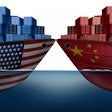
As one presidential candidate continues to talk about implementing tariffs if elected, at least one U.S. soybean industry leader expressed concerns of the ramification if those proposed tariffs become a reality.
Former U.S. President Donald Trump wants his old job back, and tariffs are being increasingly mentioned by the Republican. Jamie Beyer, director of the Minnesota Soybean Growers Association (MSGA) and a board member for the American Soybean Association (ASA) discussed her views of what could happen if tariffs are put in place and a “trade war” ensues.
Beyer spoke during a virtual press conference, hosted by the Minnesota Farmers Union, on October 16.
She referenced a recent economic study commissioned by the ASA and conducted by the World Agricultural Economic and Environmental Services (WAEES). The study examined two scenarios: a 60% tariff scenario and a 60% retaliatory tariff scenario.
That study showed that “a new trade war would result in an immediate drop in corn and soy exports and a drop in U.S. soybean and corn commodity prices,” said Beyer, whose family not only grows soybeans, but also corn, wheat, alfalfa and sugar beets.
Beyer recalled a tariff situation that occurred six years ago, and it’s one she does not want to repeat.
“My family farm weathered the 2018 China retaliatory tariffs on ag products, where soybeans were put in the center of the tariff target. We watched as the value of our soybean crop tanked in the field as we grew it, and as Brazil and Argentina were able to seize on the increase of value to their crops, pushing both the volume of South American exports and their bushel prices higher,” she said.
But she is also concerned about the future and widespread impacts of potential new tariffs.
“China’s retaliatory tariffs specifically resulted in long-term damage to U.S. farms. The economic gains for China’s most favored trade nations have allowed them to make permanent competitive improvements to their ag sectors, including permanent conversion of land use to cropping systems, changing both the global ag supply structure and environmental landscape. This study demonstrates the potential for tariffs … to remove nearly 60% of our current export value, further weighing down the market price of soybeans and resulting in an annual loss of $5.9 billion in production value for my state of Minnesota,” she said.
Beyer encouraged everyone participating in the conference to look at the WAEES study to get a closer look at the risks involved with the potential tariffs.
A journalist participating in the call asked Beyer and the other panelists if other presidential candidates have discussed tariffs. Wisconsin Farmers Union President Darin Von Ruden responded that he was only aware of one candidate to do so.
Potential soybean markets at risk
Beyer said both soybean organizations with which she is affiliated “spend a lot of time trying to mitigate the risks of having impacts from tariffs.
The MSGA has been actively working to open up new trade routes, specifically to Morocco and Uzbekistan.
Doing so is no easy task, though, because transportation, shipping, country of origin and environmental factors come into play.
Resources are utilized to “go into countries that really know nothing about soybeans and we start to show them how they can use them to improve the quality and health of their livestock production. We put on classes and courses for those people that operate feed mills so they can see how to blend in soybeans to make their operations more profitable."
Work is also done with U.S. Soybean Export Council to “try to put things in place in preparation for a trade agreement.”
But without support from state and federal governments, the implementation of trade agreements and reaching new markets is essentially unachievable, and Beyer said that challenge will be there regardless of what political party is in power.
“It just seems like at the national level, it doesn’t matter who is in power, our trade agreements sort of got pushed to the side,” she said. “So, highlighting that we need these things in place is really important to us, no matter who wins the election.”
















